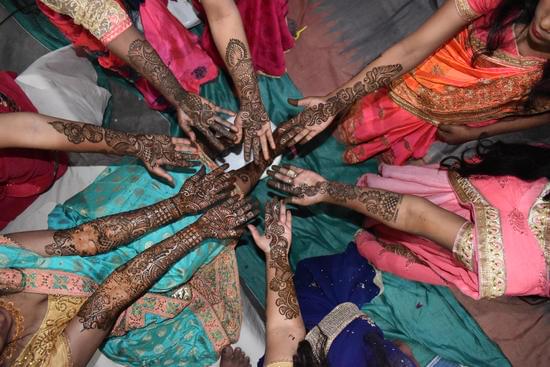A Pagan wedding is a celebration deeply rooted in the traditions and beliefs of paganism, honoring the natural world and the divine. With a rich history dating back centuries, these weddings have seen a resurgence in popularity as couples seek to incorporate their spiritual beliefs into their special day.
Pagan wedding ceremonies are a reflection of ancient customs and rituals, often drawing from Celtic, Norse, and other pagan traditions. The use of symbolism and nature plays a central role in these weddings, setting them apart from traditional Christian ceremonies. The decision to have a Pagan wedding is often driven by a desire to connect with nature, embrace unique rituals, and honor ancient traditions.
In this article, we will explore the various elements that make up a Pagan wedding ceremony, including specific customs and rituals, the incorporation of nature, attire and jewelry choices, music and symbolism, writing personalized vows, choosing the perfect location for the celebration, and planning post-wedding traditions and celebrations.
Whether you are considering having a Pagan wedding or simply have an interest in learning more about these ancient traditions, this comprehensive guide will provide valuable insights into this unique ceremonial practice.
Pagan Wedding Customs and Rituals
Description of Specific Customs and Rituals Involved in a Pagan Wedding
A pagan wedding is a ceremony that embraces the beliefs, traditions, and rituals of Paganism. One of the most well-known customs in a Pagan wedding is the handfasting ritual, where the couple’s hands are bound together with a cord to symbolize their union. Other customary rituals may include the participation of an officiant, often known as a High Priest or Priestess, and the lighting of unity candles or a sacred fire.
Symbolism Behind Different Elements of the Ceremony
Each element of a Pagan wedding holds symbolic meaning. For example, the use of natural elements like water, fire, earth, and air represents connection and balance within nature. The ceremony may also involve rituals that honor specific deities or spirits important to the couple, symbolizing their commitment to each other within the larger context of their spiritual beliefs.
How Pagan Weddings Differ From Traditional Christian Weddings
Pagan weddings differ from traditional Christian weddings in several ways. While Christian ceremonies often emphasize religious vows made before God, Pagan weddings usually focus on pledging commitments to each other and celebrating their union within nature. Additionally, Pagan weddings often contain more personalized elements tailored to each couple’s individual spiritual path rather than following religious doctrines or traditions. The connection with nature and focus on harmony with the Earth is central to many Pagan wedding customs and rituals.
The Role of Nature in Pagan Weddings
Pagan weddings are deeply rooted in the celebration of nature, and this connection to the natural world is a fundamental aspect of the ceremony. When it comes to incorporating nature into the wedding, there are various elements that couples can consider. Here are some ways in which nature plays a pivotal role in Pagan weddings:
- Choosing a Natural Setting: One of the most important decisions when planning a Pagan wedding is selecting a location that reflects the couple’s connection to nature. Outdoor venues such as gardens, forests, or beside bodies of water are popular choices for Pagan weddings. The idea is to exchange vows and celebrate surrounded by the beauty and serenity of the natural world.
- Natural Elements in Rituals: From incorporating plants, flowers, and herbs into the décor to using natural materials for ritual items like altars or ceremonial tools, Pagan weddings often make use of natural elements throughout the ceremony. For example, specific flowers or herbs might be chosen for their symbolic meanings and used during rituals such as handfasting or ring exchanges.
- Seasonal Influence: Another way in which nature influences Pagan weddings is through the changing seasons. Many Pagan couples choose to align their wedding dates with significant times in nature’s cycle, such as solstices or equinoxes. The themes and colors associated with different seasons also impact wedding decorations and overall aesthetic.
When it comes to planning a Pagan wedding, connecting with nature is at the heart of every decision made by the couple. From choosing a location that highlights the beauty of the outdoors to incorporating natural elements into rituals and ceremonies, these weddings embrace a deep appreciation for the environment and its significance in our lives.
Choosing the Perfect Location
A Pagan wedding is a deeply spiritual and nature-focused ceremony that connects the couple to the natural world and its cycle. The location of a Pagan wedding plays a crucial role in the overall atmosphere and significance of the ceremony.
When choosing the perfect location for a Pagan wedding, couples often look for natural settings such as forests, meadows, or near bodies of water. These locations are believed to be charged with powerful energy and symbolism that can enhance the spiritual experience of the wedding.
Best Venues for a Pagan Wedding
For those seeking an outdoor setting, enchanting forests or woodlands offer a mystical backdrop for a Pagan wedding. The ancient trees and abundance of flora create an ethereal ambiance that mirrors the reverence for nature in Pagan beliefs. Additionally, meadows or open fields provide expansive spaces for the ceremony and reception, allowing guests to be fully immersed in nature’s embrace.
Advice on Selecting a Natural Setting
When selecting a location for their Pagan wedding, couples should consider sites with personal significance or emotional resonance. Whether it’s where they met, where they shared meaningful experiences together, or simply a place they both love, connecting with the chosen location on a deeper level can make the ceremony even more special.
Incorporating a Connection to the Natural World
To infuse the chosen location with even more meaning, couples may choose to incorporate elements from nature into their ceremony decorations. This could include utilizing local flowers and greenery for bouquets and centerpieces, incorporating stones or crystals found at their chosen site into their décor, or arranging the seating so that guests have an unobstructed view of natural features such as mountains or rivers.
By doing so, couples can deepen their connection to both each other and the natural world during their sacred union-a central tenet of any Pagan wedding.
Pagan Wedding Attire and Jewelry
Pagan weddings are a celebration of love and union that incorporate ancient traditions and belief systems. The attire and jewelry worn by the bride and groom in a pagan wedding hold significant meaning and symbolism. Traditional Pagan wedding attire for the bride often includes flowing, natural fabrics in earthy tones, such as greens, browns, or deep reds. The groom may opt for simple yet symbolic clothing, such as a robe or tunic representing his connection to nature.
In addition to traditional wedding attire, Pagan weddings often feature unique accessories with specific meanings. Handfasting cords, which are used during the handfasting ceremony to symbolize the couple’s binding together, can be intricately crafted with meaningful colors and materials. Crowns made from natural elements like flowers or branches are also a common accessory in Pagan weddings, representing the sacredness of nature and the cycle of life.
Jewelry worn by the couple in a Pagan wedding is chosen with intention and purpose. Many couples select jewelry that incorporates natural elements like stones or symbols representing eternal love and unity.
For example, rings made from materials like wood or crystal may be chosen over traditional metal bands to symbolize the couple’s connection to nature and their unique bond. All of these elements come together to create a visually stunning representation of the couple’s commitment to one another within a larger spiritual context.
| Pagan Wedding Attire | Jewelry |
|---|---|
| Flowing, natural fabrics in earthy tones | Selection of jewelry incorporating natural elements like stones |
| Handfasting cords with meaningful colors and materials | Rings made from materials like wood or crystal |
| Crowns made from flowers or branches symbolizing nature’s sacredness |
Pagan Wedding Music and Symbols
When it comes to Pagan weddings, music and symbols play a significant role in the ceremony, adding depth and meaning to the union of the couple. Here are some key points about Pagan wedding music and symbols:
- Importance of Music: In Pagan wedding ceremonies, music holds a special place as it sets the tone for the entire event. Traditional Pagan wedding music is often chosen for its spiritual significance, with drumming, flutes, and harps being popular choices. These instruments are believed to create a harmonious and enchanting atmosphere that connects the couple to nature and the divine.
- Common Pagan Wedding Music Choices: Some common musical selections for Paga weddings include traditional folk songs, instrumental pieces inspired by nature, and chants or hymns that honor ancient deities. The music is carefully selected to reflect the spiritual beliefs of the couple and create a sacred ambiance for their union.
- Meaning Behind Popular Pagan Wedding Symbols: In addition to music, symbols also hold great importance in Pagan weddings. From Celtic knots representing eternal love to symbolic animal imagery denoting strength or wisdom, each symbol used in a Pagan wedding has deep-rooted significance. These symbols are often incorporated into decorations, clothing, jewelry, and ceremonial items as a way of acknowledging the spiritual connection between the couple, their community, and the natural world.
Incorporating meaningful music and symbols into a Pagan wedding ceremony can enhance the overall experience for both the couple getting married and their guests. When thoughtfully chosen and integrated with intentionality, these elements can help create an unforgettable celebration that honors age-old traditions while embracing personal beliefs and values.
Creating the Perfect Pagan Wedding Vows
A Pagan wedding is a spiritual ceremony that honors nature and the divine through its customs, rituals, and traditions. One of the most significant aspects of a Pagan wedding is the exchange of vows between the couple.
The vows spoken during a Pagan wedding hold deep meaning and significance, as they are a sacred promise made in the presence of nature and the divine. Creating the perfect Pagan wedding vows involves thoughtful consideration and personalization to reflect the beliefs and values of the couple.
When crafting Pagan wedding vows, couples often draw inspiration from nature, ancient mythology, and their spiritual connection to the world around them. The vows may include promises to honor and respect nature, uphold equality within the relationship, and support each other’s spiritual growth.
Many Pagan couples choose to incorporate symbolism such as elements of earth, air, fire, water, or references to mythological deities into their vows. This adds a deeply symbolic layer to the promises being made and reflects the couple’s commitment to their spiritual beliefs.
In addition to drawing inspiration from nature and mythology, creating the perfect Pagan wedding vows involves infusing personal experiences and emotions into the words spoken. Couples often express their love for each other through heartfelt sentiments that reflect their unique journey together. Ultimately, Pagan wedding vows are an opportunity for couples to articulate their deepest feelings, aspirations for their relationship, and dedication to each other within a sacred and spiritual context.
Post-Wedding Traditions and Celebrations
In conclusion, a Pagan wedding is a beautiful and meaningful ceremony that is deeply rooted in nature and traditional customs. The history of Pagan wedding traditions dates back centuries, with symbolism and rituals that are rich in meaning and significance. Many people choose to have a Pagan wedding because it allows them to connect with nature, honor their heritage, and create a personalized and unique ceremony.
One of the most significant aspects of a Pagan wedding is the incorporation of natural elements, reflecting the importance of nature in Pagan beliefs. From selecting the perfect outdoor venue to choosing seasonal themes, nature plays a central role in every aspect of the ceremony. This connection to the natural world sets Pagan weddings apart from traditional Christian weddings and adds a sense of spirituality and reverence for the Earth.
Following the beautiful ceremony, Pagan weddings are often celebrated with feasts and post-wedding traditions that bring together loved ones to honor the newlyweds. These celebrations are an integral part of Pagan culture and serve as an opportunity for community bonding and rejoicing. Overall, a Pagan wedding offers couples the chance to express their love in a way that is deeply meaningful and spiritually significant, surrounded by nature and guided by ancient traditions.
Frequently Asked Questions
What Does a Pagan Wedding Mean?
A Pagan wedding is a ceremony that follows the traditions and beliefs of Paganism, which is a modern religious movement based on nature-based spirituality. Pagan weddings often involve rituals and customs that honor nature, the elements, and the divine feminine and masculine energies.
What Are the Promises of a Pagan Wedding?
The promises made during a Pagan wedding can vary depending on the specific tradition or belief system followed by the couple. Some common promises may include vows to honor and respect nature, to support each other’s spiritual growth, and to cherish the interconnectedness of all living beings.
What Do You Wear to a Pagan Wedding?
Guests attending a Pagan wedding are typically encouraged to wear attire that reflects the natural surroundings and honors the elements. This could include earthy colors, flowing fabric, floral patterns, or even traditional clothing associated with specific Pagan traditions. The key is to dress in a way that shows respect for nature and the spiritual significance of the occasion.

I have been involved in marriages for over 20 years helping couples and singles understand more about them.





